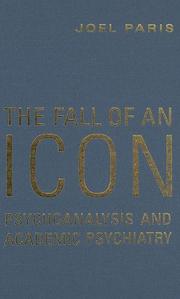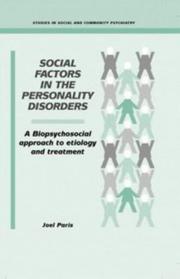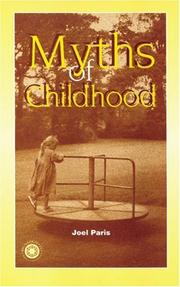| Listing 1 - 10 of 26 | << page >> |
Sort by
|
Book
ISBN: 9780199738175 0199738173 Year: 2013 Publisher: New York : Oxford University Press,
Abstract | Keywords | Export | Availability | Bookmark
 Loading...
Loading...Choose an application
- Reference Manager
- EndNote
- RefWorks (Direct export to RefWorks)
Mental Disorders --- diagnosis --- classification --- Diagnostic and Statistical Manual of Mental Disorders --- Maladies mentales --- Classification --- Diagnostic --- Classification. --- Diagnostic. --- Mental Disorders - diagnosis --- Mental Disorders - classification
Book
ISBN: 0128114223 0128114215 9780128114223 9780128114216 Year: 2017 Publisher: London, England : Academic Press,
Abstract | Keywords | Export | Availability | Bookmark
 Loading...
Loading...Choose an application
- Reference Manager
- EndNote
- RefWorks (Direct export to RefWorks)
Borderline personality disorder. --- Borderline personality disorder --- Treatment. --- Personality disorders
Book
ISBN: 1281944386 9786611944384 0199718318 9780199718313 9781281944382 9780195313833 0195313836 6611944389 0197708358 0190295333 Year: 2008 Publisher: Oxford ; New York : Oxford University Press,
Abstract | Keywords | Export | Availability | Bookmark
 Loading...
Loading...Choose an application
- Reference Manager
- EndNote
- RefWorks (Direct export to RefWorks)
The practice of psychiatry has undergone great changes in recent years. In this book, Joel Paris, MD, a veteran psychiatrist, provides a fluently written and accessible "state-of-the-field" assessment. Himself a clinician, researcher, and teacher, Paris focuses on the most striking change within the field - the diverging roles of psychopharmacology and psychotherapy - and proposes possible future directions for the specialty.
Psychiatry --- Psychotherapy --- Philosophy. --- Methodology. --- Mental Disorders. --- methods.

ISBN: 0802039332 1282029177 9786612029172 1442681241 9781442681248 9781282029170 0802037720 9780802039330 9780802037725 Year: 2005 Publisher: Toronto
Abstract | Keywords | Export | Availability | Bookmark
 Loading...
Loading...Choose an application
- Reference Manager
- EndNote
- RefWorks (Direct export to RefWorks)
Over the last few decades, academic psychiatry has undergone a revolution. After the Second World War, most department chairs were psychoanalysts who belonged to separate institutes, not subject to the checks and balances of academia, and who did not subscribe to the tenets of scientific medicine. The revolution against psychoanalytic dominance began when a group of psychiatrists developed an evidence-based model that brought psychiatry back into the medical mainstream. In The Fall of an Icon, Joel Paris narrates the history of this transition, placing it in the context of current trends in science and medicine. He illustrates the story using interviews with prominent academic psychiatrists in Canada and the United States, and describes his own experiences as a psychiatrist: how he was caught up in the excitement of the psychoanalytic model, how he became disillusioned with it, and how he came to a new and more scientific view of his discipline. This is an essential work for understanding the recent history of psychiatry.
Psychiatry --- Psychoanalysis --- Medicine and psychology --- Mental health --- Psychology, Pathological --- Psychology --- History. --- États-Unis. --- United States. --- Canada. --- United States --- Canada --- ABŞ --- ABSh --- Ameerika Ühendriigid --- America (Republic) --- Amerika Birlăshmish Shtatlary --- Amerika Birlăşmi Ştatları --- Amerika Birlăşmiş Ştatları --- Amerika ka Kelenyalen Jamanaw --- Amerika Qūrama Shtattary --- Amerika Qŭshma Shtatlari --- Amerika Qushma Shtattary --- Amerika (Republic) --- Amerikai Egyesült Államok --- Amerikanʹ Veĭtʹsėndi͡avks Shtattnė --- Amerikări Pĕrleshu̇llĕ Shtatsem --- Amerikas Forenede Stater --- Amerikayi Miatsʻyal Nahangner --- Ameriketako Estatu Batuak --- Amirika Carékat --- AQSh --- Ar. ha-B. --- Arhab --- Artsot ha-Berit --- Artzois Ha'bris --- Bí-kok --- Ē.P.A. --- É.-U. --- EE.UU. --- Egyesült Államok --- ĒPA --- Estados Unidos --- Estados Unidos da América do Norte --- Estados Unidos de América --- Estaos Xuníos --- Estaos Xuníos d'América --- Estatos Unitos --- Estatos Unitos d'America --- Estats Units d'Amèrica --- Ètats-Unis d'Amèrica --- États-Unis d'Amérique --- ÉU --- Fareyniḳṭe Shṭaṭn --- Feriene Steaten --- Feriene Steaten fan Amearika --- Forente stater --- FS --- Hēnomenai Politeiai Amerikēs --- Hēnōmenes Politeies tēs Amerikēs --- Hiwsisayin Amerikayi Miatsʻeal Tērutʻiwnkʻ --- Istadus Unidus --- Jungtinės Amerikos valstybės --- Mei guo --- Mei-kuo --- Meiguo --- Mî-koet --- Miatsʻyal Nahangner --- Miguk --- Na Stàitean Aonaichte --- NSA --- S.U.A. --- SAD --- Saharat ʻAmērikā --- SASht --- Severo-Amerikanskie Shtaty --- Severo-Amerikanskie Soedinennye Shtaty --- Si͡evero-Amerikanskīe Soedinennye Shtaty --- Sjedinjene Američke Države --- Soedinennye Shtaty Ameriki --- Soedinennye Shtaty Severnoĭ Ameriki --- Soedinennye Shtaty Si͡evernoĭ Ameriki --- Spojené obce severoamerické --- Spojené staty americké --- SShA --- Stadoù-Unanet Amerika --- Stáit Aontaithe Mheiriceá --- Stany Zjednoczone --- Stati Uniti --- Stati Uniti d'America --- Stâts Unîts --- Stâts Unîts di Americhe --- Steatyn Unnaneysit --- Steatyn Unnaneysit America --- SUA --- Sŭedineni amerikanski shtati --- Sŭedinenite shtati --- Tetã peteĩ reko Amérikagua --- U.S. --- U.S.A. --- United States of America --- Unol Daleithiau --- Unol Daleithiau America --- Unuiĝintaj Ŝtatoj de Ameriko --- US --- USA --- Usono --- Vaeinigte Staatn --- Vaeinigte Staatn vo Amerika --- Vereinigte Staaten --- Vereinigte Staaten von Amerika --- Verenigde State van Amerika --- Verenigde Staten --- VS --- VSA --- Wááshindoon Bikéyah Ałhidadiidzooígíí --- Wilāyāt al-Muttaḥidah --- Wilāyāt al-Muttaḥidah al-Amirīkīyah --- Wilāyāt al-Muttaḥidah al-Amrīkīyah --- Yhdysvallat --- Yunaeted Stet --- Yunaeted Stet blong Amerika --- ZDA --- Združene države Amerike --- Zʹi͡ednani Derz͡havy Ameryky --- Zjadnośone staty Ameriki --- Zluchanyi͡a Shtaty Ameryki --- Zlucheni Derz͡havy --- ZSA --- Canada (Province) --- Canadae --- Ceanada --- Chanada --- Chanadey --- Dominio del Canadá --- Dominion of Canada --- Jianada --- Kʻaenada --- Kaineḍā --- Kanada --- Ḳanadah --- Kanadaja --- Kanadas --- Ḳanade --- Kanado --- Kanakā --- Province of Canada --- Republica de Canadá --- Yn Chanadey
Book
ISBN: 0199353298 0199970211 9780199970216 1299610560 9781299610569 9780199353293 9780199738175 0199738173 Year: 2013 Publisher: Oxford : Oxford University Press,
Abstract | Keywords | Export | Availability | Bookmark
 Loading...
Loading...Choose an application
- Reference Manager
- EndNote
- RefWorks (Direct export to RefWorks)
The Intelligent Clinician's Guide to the DSM-5RG explores all revisions to the latest version of the Diagnostic and Statistics Manual, and shows clinicians how they can best apply the strong points and shortcomings of psychiatry's most contentious resource. Written by a celebrated professor of psychiatry, this reader-friendly book uses evidence-based critiques and new research to point out where DSM-5 is right, where it is wrong, and where the jury's still out. Along the way, The Intelligent Clinician's Guide to the DSM-5RG sifts through the many public controversies and clinical debates surro
Mental illness --- Psychology, Pathological --- Nosology --- Psychiatric diagnosis --- Psychodiagnostics --- Diagnosis. --- Diagnostic and statistical manual of mental disorders. --- DSM-5 --- DSM-V

ISBN: 0511722168 0521472245 0521032660 Year: 1996 Publisher: Cambridge : Cambridge University Press,
Abstract | Keywords | Export | Availability | Bookmark
 Loading...
Loading...Choose an application
- Reference Manager
- EndNote
- RefWorks (Direct export to RefWorks)
Personality disorders have been recognized as categories of psychiatric illness, and still need to be better defined. This book interprets the personality disorders as products of the interaction between social influences and other aetiological factors as part of a broad biopsychosocial model, and explains how personality traits develop into personality disorders. Strongly oriented towards recent empirical findings, the author argues that although biological, psychological and social factors are all necessary, none of them is by itself sufficient to produce a personality disorder. This basic model is also a model of treatment, in which biological, experiential and social factors should all be addressed in therapy and his treatment recommendations focus particularly on social adjustment through the adaptive use of personality traits.
Personality disorders --- Disorders of personality --- Personality --- Personality, Disorders of --- Psychology, Pathological --- Social aspects. --- Etiology. --- Treatment. --- Disorders --- Health Sciences --- General and Others
Book
ISBN: 9781615373680 1615373683 1615373349 9781615373345 Year: 2021 Publisher: Washington, DC
Abstract | Keywords | Export | Availability | Bookmark
 Loading...
Loading...Choose an application
- Reference Manager
- EndNote
- RefWorks (Direct export to RefWorks)
"Over the last two decades, spurred particularly by the decoding of the genome, neuroscience has advanced to become the primary basis of clinical psychiatry, even as environmental risk factors for mental disorders have been deemphasized. In this thoroughly revised, second edition of Nature and Nurture in Mental Disorders, the author argues that an overreliance on biology at the expense of environment has been detrimental to the field-that, in fact, the "nature versus nurture" dichotomy is unnecessary. Instead, he posits a biopsychosocial model that acknowledges the role an individual's predisposing genetic factors, interacting with environmental stressors, play in the etiology of many mental disorders. The first several chapters of the book provide an overview of the theories that affect the study of genes, the environment, and their interaction, examining what the empirical evidence has revealed about each of these issues. Subsequent chapters apply the integrated model to a variety of disorders, reviewing the evidence on how genes and environment interact to shape disorders including depressive disorders, PTSD, neurodevelopmental disorders, eating disorders, and personality disorders. By rejecting both biological and psychosocial reductionism in favor of an interactive model, Nature and Nurture in Mental Disorders offers practicing clinicians a path toward a more flexible, effective treatment model. And where controversy or debate still exist, an extensive reference list provided at the end of the book, updated for this edition to reflect the most current literature, encourages further study and exploration"--
Mental Disorders --- Mental disorders --- Genetic Predisposition to Disease --- Stress, Psychological --- Models, Psychological --- genetics --- psychology --- Mental illness --- Stress (Psychology) --- Psychology, Pathological. --- Genetic Predisposition to Disease. --- Stress, Psychological. --- Models, Psychological. --- Genetic aspects. --- genetics. --- psychology. --- Model, Mental --- Model, Psychological --- Models, Mental --- Models, Psychologic --- Psychological Models --- Mental Model --- Mental Models --- Model, Psychologic --- Psychologic Model --- Psychologic Models --- Psychological Model --- Psychological Stress --- Stress, Psychologic --- Stressor, Psychological --- Life Stress --- Life Stresses --- Psychologic Stress --- Psychological Stresses --- Psychological Stressor --- Psychological Stressors --- Stress, Life --- Stresses, Life --- Stresses, Psychological --- Stressors, Psychological --- Predisposition, Genetic --- Susceptibility, Genetic --- Genetic Predisposition --- Genetic Susceptibility --- Genetic Predispositions --- Genetic Susceptibilities --- Predispositions, Genetic --- Susceptibilities, Genetic --- Disease Susceptibility --- Genetic Testing --- Anticipation, Genetic --- Genetic Association Studies --- Gene-Environment Interaction --- Abnormal psychology --- Diseases, Mental --- Mental diseases --- Pathological psychology --- Psychology, Abnormal --- Psychopathology --- Neurology --- Brain --- Criminal psychology --- Mental health --- Psychiatry --- Psychoanalysis --- Emotional stress --- Mental stress --- Psychological stress --- Tension (Psychology) --- Psychology --- Diathesis-stress model (Psychology) --- Life change events --- Type A behavior --- Diseases --- Mental Disorders - genetics --- Mental disorders - psychology
Book
ISBN: 9781615373345 1615373349 Year: 2021 Publisher: Washington, DC American Psychiatric Association Publishing
Abstract | Keywords | Export | Availability | Bookmark
 Loading...
Loading...Choose an application
- Reference Manager
- EndNote
- RefWorks (Direct export to RefWorks)
"Over the last two decades, spurred particularly by the decoding of the genome, neuroscience has advanced to become the primary basis of clinical psychiatry, even as environmental risk factors for mental disorders have been deemphasized. In this thoroughly revised, second edition of Nature and Nurture in Mental Disorders, the author argues that an overreliance on biology at the expense of environment has been detrimental to the field-that, in fact, the "nature versus nurture" dichotomy is unnecessary. Instead, he posits a biopsychosocial model that acknowledges the role an individual's predisposing genetic factors, interacting with environmental stressors, play in the etiology of many mental disorders. The first several chapters of the book provide an overview of the theories that affect the study of genes, the environment, and their interaction, examining what the empirical evidence has revealed about each of these issues. Subsequent chapters apply the integrated model to a variety of disorders, reviewing the evidence on how genes and environment interact to shape disorders including depressive disorders, PTSD, neurodevelopmental disorders, eating disorders, and personality disorders. By rejecting both biological and psychosocial reductionism in favor of an interactive model, Nature and Nurture in Mental Disorders offers practicing clinicians a path toward a more flexible, effective treatment model. And where controversy or debate still exist, an extensive reference list provided at the end of the book, updated for this edition to reflect the most current literature, encourages further study and exploration"--
Mental illness --- Mental Disorders --- Genetic Predisposition to Disease --- Stress, Psychological --- Models, Psychological --- Model, Mental --- Model, Psychological --- Models, Mental --- Models, Psychologic --- Psychological Models --- Mental Model --- Mental Models --- Model, Psychologic --- Psychologic Model --- Psychologic Models --- Psychological Model --- Psychological Stress --- Stress, Psychologic --- Stressor, Psychological --- Life Stress --- Life Stresses --- Psychologic Stress --- Psychological Stresses --- Psychological Stressor --- Psychological Stressors --- Stress, Life --- Stresses, Life --- Stresses, Psychological --- Stressors, Psychological --- Predisposition, Genetic --- Susceptibility, Genetic --- Genetic Predisposition --- Genetic Susceptibility --- Genetic Predispositions --- Genetic Susceptibilities --- Predispositions, Genetic --- Susceptibilities, Genetic --- Disease Susceptibility --- Genetic Testing --- Anticipation, Genetic --- Genetic Association Studies --- Gene-Environment Interaction --- Madness --- Mental diseases --- Mental disorders --- Disabilities --- Psychology, Pathological --- Mental health --- Genetic aspects --- genetics --- psychology
Book
ISBN: 9781909726062 9781108699587 Year: 2013 Publisher: London RCPsych Publications
Abstract | Keywords | Export | Availability | Bookmark
 Loading...
Loading...Choose an application
- Reference Manager
- EndNote
- RefWorks (Direct export to RefWorks)

ISBN: 087630966X Year: 2000 Publisher: Philadelphia (Pa.) : Brunner/Mazel,
Abstract | Keywords | Export | Availability | Bookmark
 Loading...
Loading...Choose an application
- Reference Manager
- EndNote
- RefWorks (Direct export to RefWorks)
Developmental psychology. --- Nature and nurture. --- Ontwikkelingspsychologie --- Psychology, Pathological --- handboeken en inleidingen. --- Etiology.
| Listing 1 - 10 of 26 | << page >> |
Sort by
|

 Search
Search Feedback
Feedback About UniCat
About UniCat  Help
Help News
News